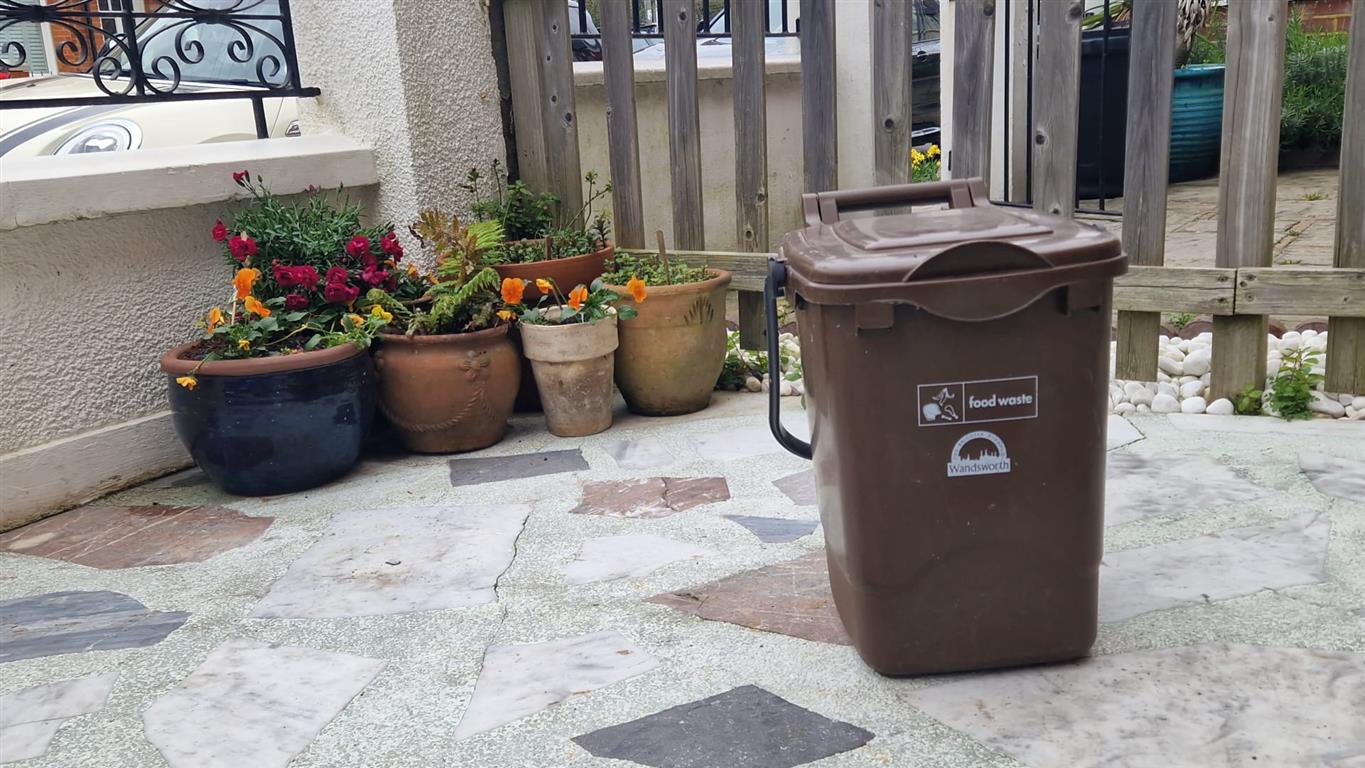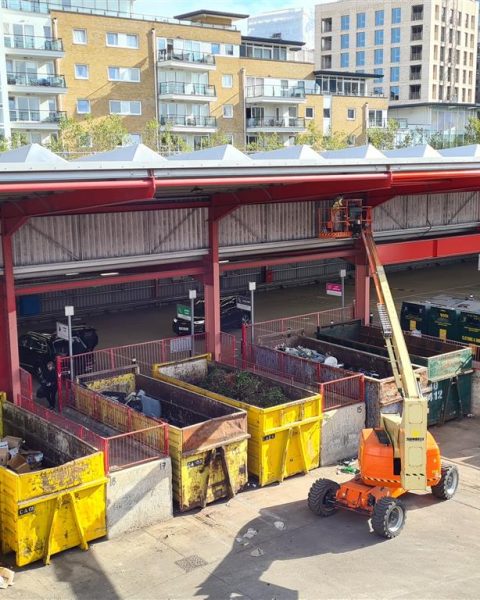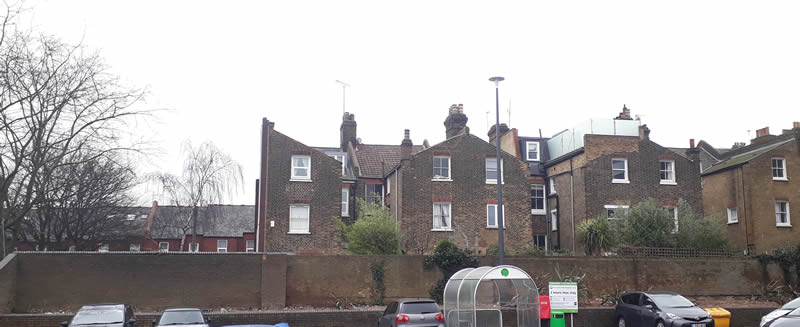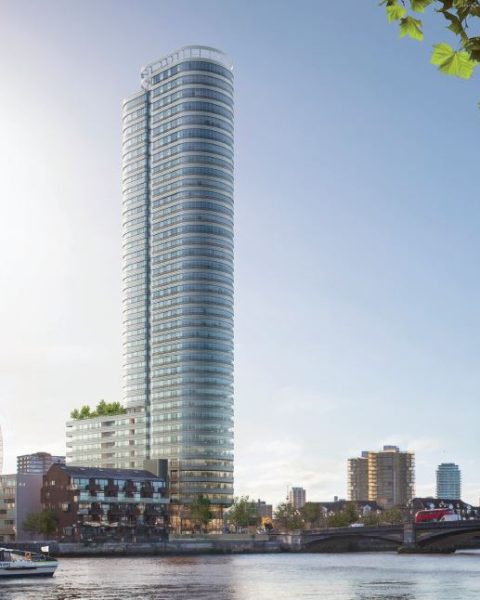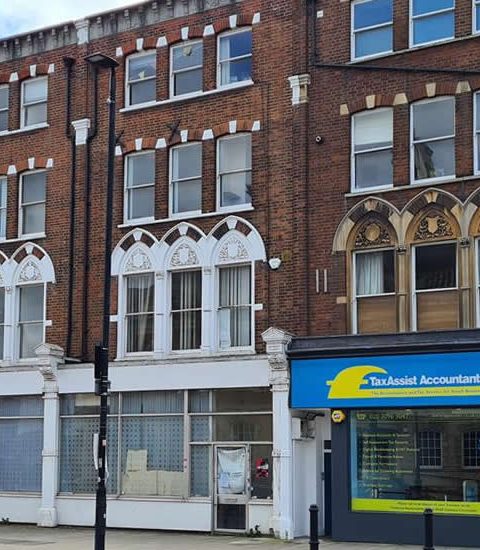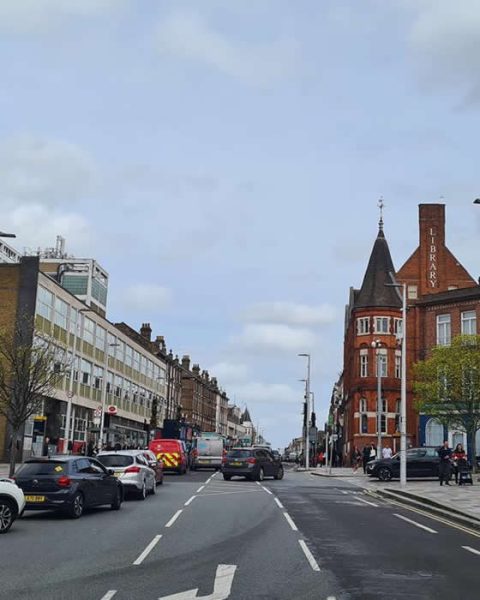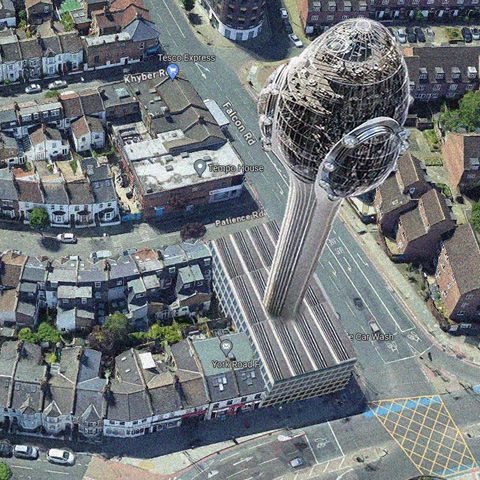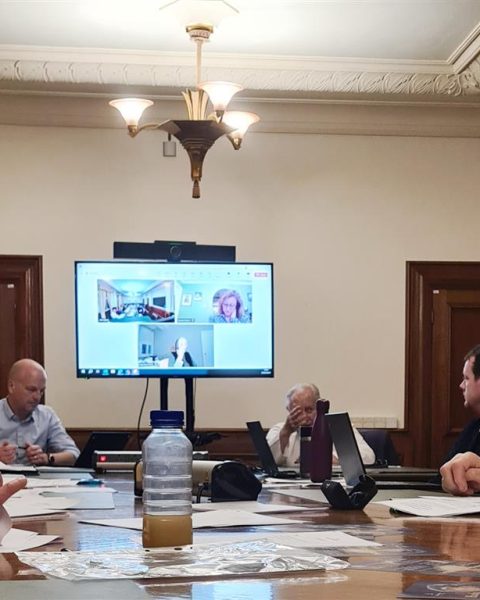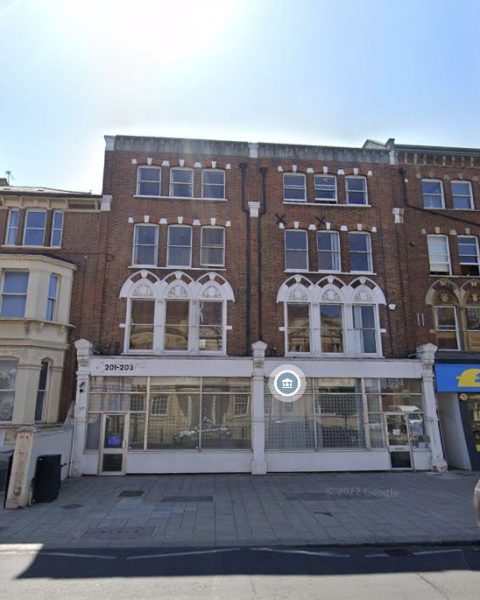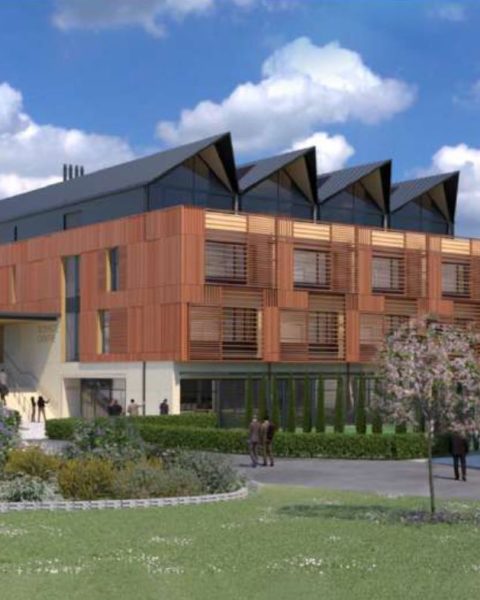This was one of the Labour’s pledge during the local election campaign in 2022: promote a food waste collection throughout the entire borough. When we talked to Councillor Judi Gasser, Cabinet member for the Environment, last year, she told us that organising this initiative turned out to be more challenging than initially anticipated (partly due to the fact that they needed to review requirements with the contractors in charge of the refuse collection).
A limited food waste trial started in Southfields Grid, in November 2021 under the Conservative administration. It was collected weekly as part of the borough’s normal refuse and recycling collection service and has proven to be successful. It served 2,300 households, capturing an average of 1.3 kg per household per week. By June 2023, it had expanded to an additional 3,620 properties.
The Council reported collecting 215 tonnes of food waste during the trial period from November 2021 to May 2023.
Last autumn, the trial was expanded to include some blocks of flats including Andrew Reed House, Linstead Way, the Balham Hill East and West Estates and the Wandsworth Council managed blocks within the existing Southfields trial area. In blocks of flats, residents receive a kitchen caddy and free liner bags, but not the outdoor brown caddy. Instead, they are requested to carry filled liner bags to communal food recycling bins located next to their existing recycling facilities.
According to the Council, a recent survey found that 90% of respondents had used and continued to use the service.
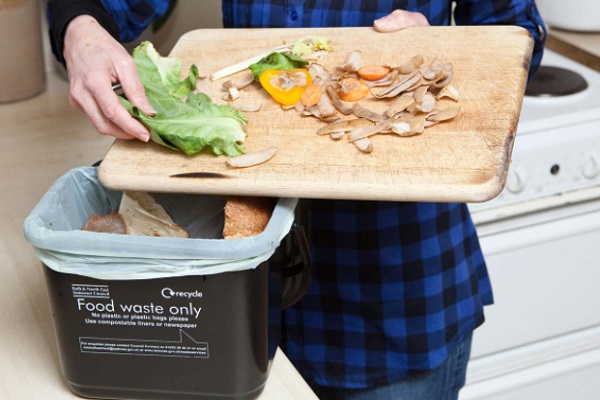
The Council has now decided that food waste collection will start in all other areas of the borough not yet part of the trial scheme from Monday 10 June, on the usual collection day. Material to start separating food waste (including compostable caddy liners to start, 5 litre food waste indoor caddy and a large 23 litre outdoor caddy) will be delivered between 8 April and 7 June. However, it is specifically requested to avoid putting food waste in the caddy before the week starting June 3th.
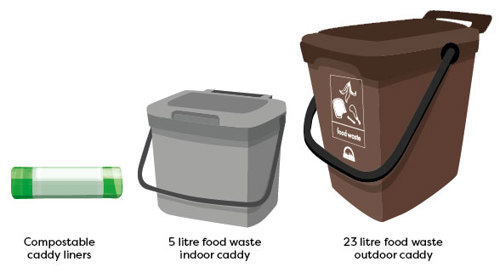
The food that they collect using the new brown caddies is sent to an anaerobic digestion plant where micro-organisms break it down to produce a biogas that’s fed into the National Grid, as well as liquid fertiliser used to improve agricultural soils.
Initially, the service will be reserved for households with adequate space in their front gardens. In some cases, when space is restricted, residents might want to share the bin with their neighbours, the Council told us.
Every eligible household for the new service received a leaflet last week providing details about the plan. Flats and estates are expected to receive the service later this year, before the end of 2024.
The collection will be made in separate vehicles and new collection vehicles have been purchased, running on bio-fuel, known as hydrotreated vegetable oil, which releases up to 90% lower emissions than diesel according to the Council. These new vehicles have a single compartment rather than the current dual compartment for collecting both recycling and refuse simultaneously, deemed more efficient. Therefore, with the use of the new vehicles, different collections (refuse, recycling, and food waste) will be conducted by different teams at different times.
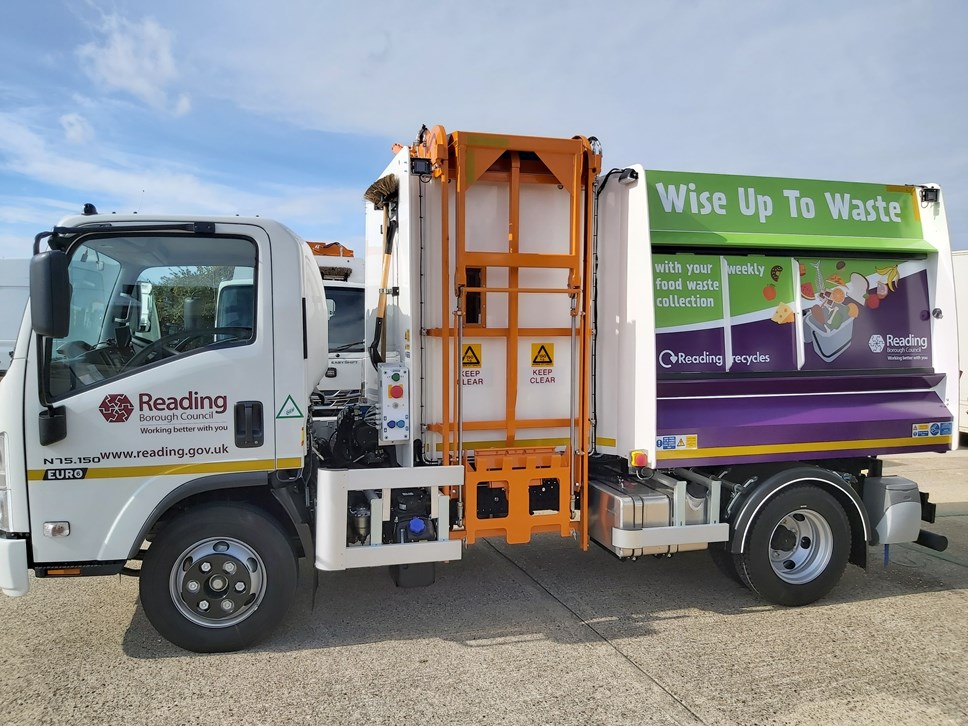
Last but not least, the Council announced that small electrical collections will also occur on normal collection day. It will include plug, battery or cables, electric kettle, coffee maker, iron …etc.
- Read our article: A journey through Smugglers Way: Exploring the full process in Wandsworth’s recycling centre
Residents involved in the trial scheme are positive
On social media, residents have expressed concerns with more foxes attracted by the food waste. However, the Council has given instructions on leaflets to always leave the handle of the caddy in the upright position to ensure it is locked and animals don’t get to it.
In areas where the scheme has not yet been extended, some of the residents express doubts on social media, with one of them stating on the forum nappyvallyenet.com:
“This is so not wanted by the majority and another outrageous waste of taxpayers money by the new Labour council. (My new bin will to straight to the tip)”
An other one said:
“Where the hell am I supposed to put a kitchen caddy? I’m not going to have a box of rotting food on my counter top (plus it would take up too much room.)”
However, others are much more enthusiastic. In Lambeth, where there is already such scheme in place, a resident commented:
“We have had food waste bins in Lambeth for a while. They are lockable so if used properly foxes cannot open them. We never had a problem despite having foxes living quite close.
We normally keep a kitchen caddy in our kitchen (as you would guess from the name 🙂 and the larger, kerbside bin in our back garden.
It doesn’t cause any more smell than putting the same waste in the black bins, and it’s more fox-proof.”
Another resident said:
“Food waste collection is one of the most straightforward & cost effective things we can do to lower carbon footprint from households – it really is low hanging fruit.
Of course the bin & system needs to be decently fox-proof and given Wandsworth is one of the last councils to bring this in, I hope they will have researched the choice of containers properly.
This is progress, yes there may be some teething problems, but let’s hope these are resolvable. Climate change is very real, anyone who says otherwise is a not a person to be taken seriously, your grandkids need you to process your food waste please.”
Some of the residents with enough space in their garden already use a compost bin. However, it must be noted that not all food was can fill their garden composter, especially meat, fat, dairy and bones. Therefore, being an avid composter doesn’t prevent people from recycling other food waste with the new service provided by the Council.
The council’s spokesperson said:
“We urge all residents to give it a try. It’s important that food waste is removed from the general household waste collection service, not only for environmental and financial reasons but also to keep our streets cleaner with fewer black sacks being ripped open by foxes and other animals creating spillage.”
Of course, if some residents refuse to use the service, the Council said they will make arrangements to take back their food bin and caddy when they are contacted.
Cost of the new service
The new food waste service comes at a cost and was discussed at the Environment Committee last September 2023. Five out of six councillors voted in favor of extending the contract of the company in charge of collections (Serco) for another four years. This extension includes tougher performance management and service expectations, along with a commitment to deliver better social value.
There are two types of costs: a one-off cost to provide containers and new vehicles, and a yearly cost to run the service.
The full implementation cost (one-off) is £3.8m, with two-thirds of that amount allocated to six 12-tonne Plastic Bodied Utility Vehicles (PBUVs) funded from the existing waste fleet replacement budget, and £1.2m spent on communal food waste bins. Excluding the new vehicles, the one-off cost for the scheme is approximately £37 per household benefiting from it. It’s worth noting that the cost includes at least a 5% contingency for storing replacement containers.
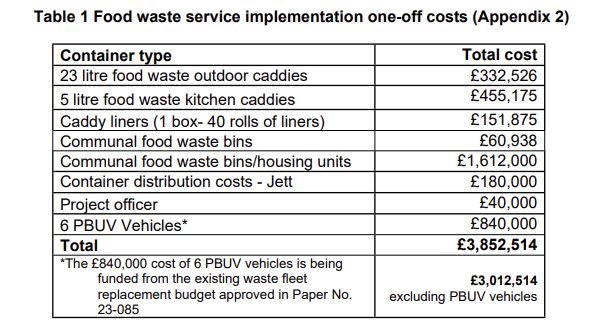
The estimated annual cost of replacement caddies is around £20,000 starting from 2025/26. Initially, caddy liners will be provided to encourage residents to start using the service, but afterward, it will be the residents’ responsibility to provide these liners.
The cost to run the trial is estimated at £150,000 in 2023/24. The annual cost to extend this provision borough-wide will be £1.189m, requiring additional budget provision.
However, it’s also estimated that the Council will increase the borough’s recycling rate by 3 to 4%, generating a saving of about £725,000 per year.
The Council has prepared a revised waste Reduction and Recycling Plan (RRP) for 2024/25 with the Greater London Authority (GLA) which details plans to achieve the Mayor’s London-wide targets to cut food waste and achieve 65% waste recycling by 2030.
Food Waste collection is a requirement for all London boroughs set by the Greater London Authority (GLA). While 24 out of 33 boroughs have kerbside collection, the GLA currently works with the remaining ones to set individual commitments. In addition, this is a government requirement that waste collection authorities are required to introduce weekly food waste collections to all households in England, including flats, by 31 March 2026.
You can produce your own compost at home using leftovers and food scraps. Find out how to compost at home.
As advised on the council website, you can buy compost bins and wormeries from GetComposting. They provide a wide range of affordable containers that are available via mail order.
UPDATE 28/03/2024: Additional information on trial for block of flats, government requirement for March 2026 and what happens if some residents don’t want to use the service.


